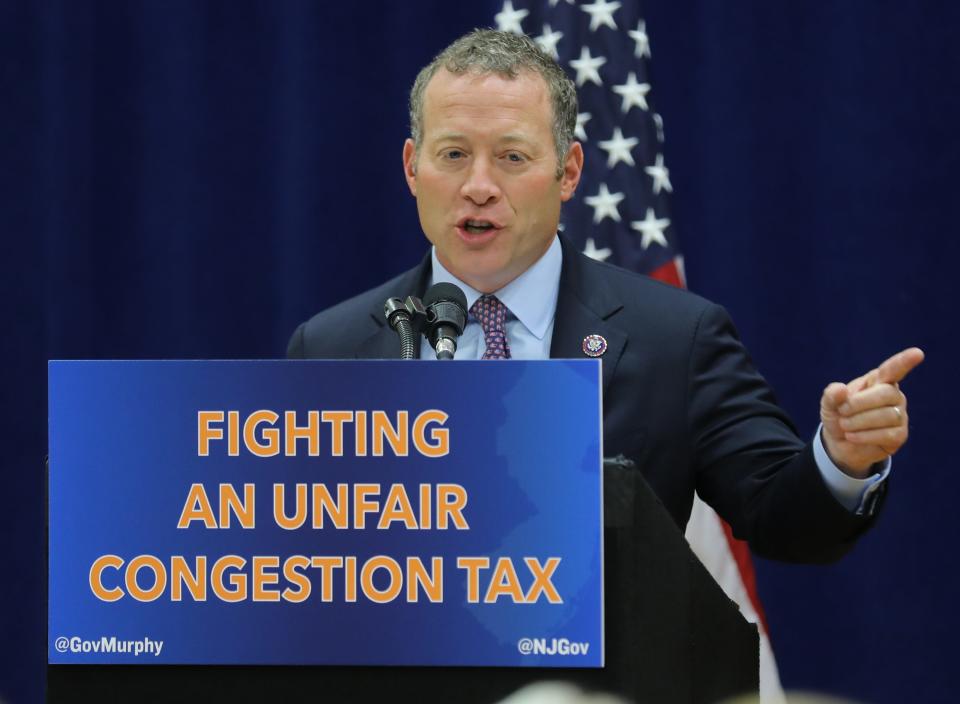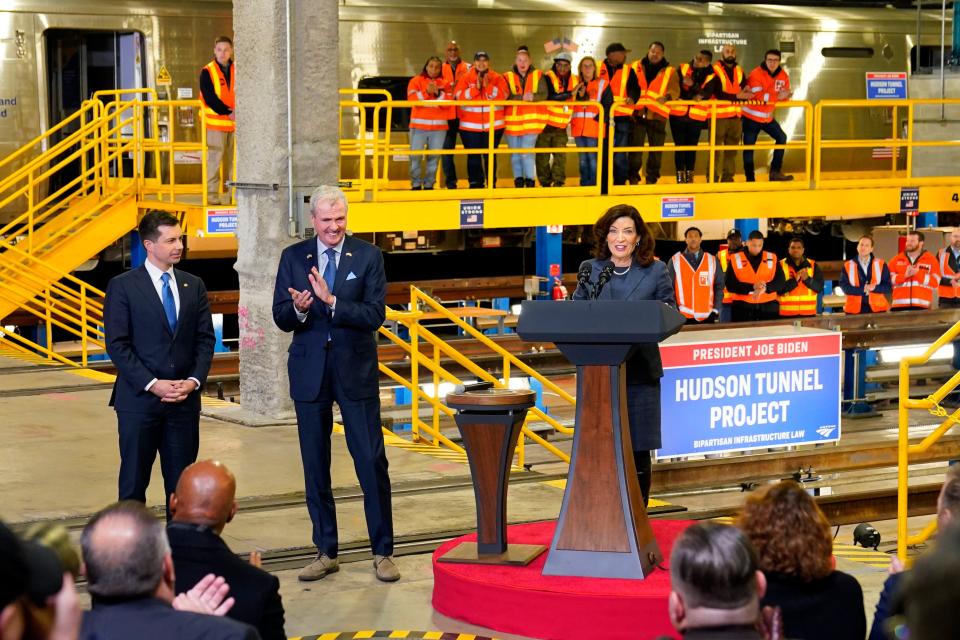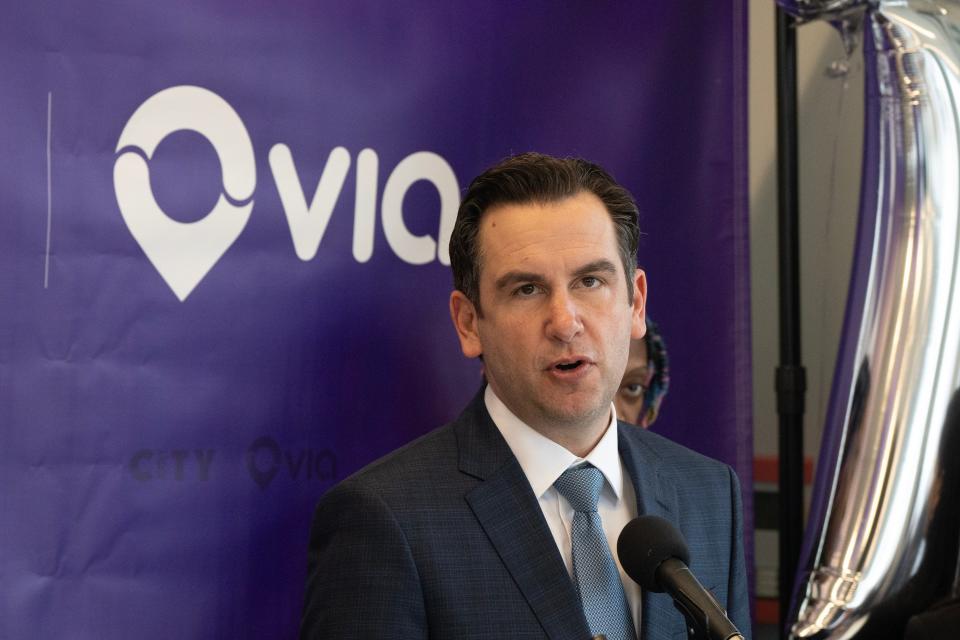Congestion pricing's death is a political win for NJ Democrats. At what cost? | Stile
In the early Democratic Party pre-primary for next year’s New Jersey governor’s race, Rep. Josh Gottheimer notched a political victory after New York Gov. Kathy Hochul’s jilting-at-the-altar decision to "pause" congestion pricing.
The Bergen County Democrat was quick to pound away at the proposed $15 additional toll for cars and trucks driving south of 60th Street in Manhattan at peak hours as a devastating tax on New Jersey commuters. He dueled with the spiky Metropolitan Transit Authority CEO, Janno Lieber; he filed lawsuits; he fired off populist-themed press release after press release; he warned of the threat of "cancer-causing pollution" as trucks seek alternative routes, and railed at the injustice of it all at the base of the George Washington Bridge.
“After a five-year fight, New York appears to have done right by hardworking Jersey families and backed off their outrageous congestion tax," Gottheimer said last week. “Five years ago, I said that we would fight for Jersey families until the very end and that’s exactly what we did. We threw the kitchen sink at New York — and then some — and got it done.”

A short-term victory could be a longterm disaster for NJ commuters
Yet, Gottheimer's short-term victory is a big loss for the bulk of New Jersey commuters who head to New York each day by rail or bus. The money raised from the new fees would have been spent improving the subways and buses that many Garden State commuters hop on once they arrive in Manhattan. It would have meant safer, less crowded streets for those who walk to their Manhattan offices once they arrive. The air quality would have improved.
Now, it won’t happen. The MTA, which was depending on that money to raise $1 billion in revenues that would leverage $15 billion in capital improvements, will now simply focus on “basic stuff to make sure the system doesn't fall apart," as a defeated Lieber described it.
In other words, the mass transit system — the lifeblood of the region’s working class — will trundle along with inefficient equipment and delays, with workers dodging the daily gridlock, gulping the filthy air and submitting to a dreary, unreliable commuting future.
“All of those improvements, you know, are going to be out the window unless they figure out another funding source," said Alex Ambrose, a policy analyst for the New Jersey Policy Perspective, a liberal think tank that supported the tolling plan.
That could be a long wait, maybe not as long as replacing the decaying, century-old Hudson River rail tunnels — another mass transit debacle that set the region back when Gov. Chris Christie canceled the Access To the Region Core project in 2010 to bolster his national ambitions. That project would have been completed by now, but a more expensive sequel, the Gateway project, won’t be completed for decades. Hochul's plug pulling will have similar consequences as the Regional Plan Association's Tom Wright and Kate Slevin wrote last week in an op-ed for The New York Times.
“Her decision to suspend this program at the 11th hour raises real concerns about the region’s collective ability to pursue major and essential public projects that will benefit residents, commuters and visitors now and in the future,” Wright and Slevin wrote.

There is no doubt that an extra $15 toll was steep, and no doubt that it would have affected some hardworking commuters, like the nurse from the western suburbs who worked overnight shifts at a midtown hospital, a favorite, unnamed victim of Gottheimer's anti-congestion pricing crusade. But in reality, those commuters are only a small portion of Garden State residents who travel to Manhattan to work. Roughly 5% to 10% of New Jersey’s 447,000 commuters drive into the city each day, and, according to a 2021 study by the Tri-State Transportation Campaign, most of those drivers are wealthy. Many would have likely shelled out the extra $15 to keep driving.
So for all the hysteria and concern about the beleaguered NJ commuter facing the catastrophic congestion pricing, killing the plan was a victory for a smaller band of wealthy commuters at the expense of a much larger population of middle- to lower-income commuters who rely on mass transit.
What's next?: NYC congestion pricing is on hold. How did that happen? What about NJ suit?
Mike Kelly: In NYC congestion pricing fight, suburban voters trumped infrastructure investment
What does all of this spell for New Jersey? For Democrats? For NJ Transit?
From a Democratic Party point of view, shelving the plan for an undetermined future — how about never? — was primarily about polling and maintaining hopes of a Democratic control of the House. The plan was unpopular on Long Island and in the northern suburbs of Westchester, Putnam and Rockland counties, which are home to several House districts in play this year. Congestion pricing was a threat and there is little doubt that the party overlords in Washington had a big say in snuffing the plan just before its scheduled launch on June 30.
But for the Democratic hopefuls next year, Gottheimer gets the prize for leading the parade. U.S. Rep. Mikie Sherrill, D-Montclair, another New Jersey gubernatorial hopeful, saluted the demise of the tolling plan, although her activism and grandstanding paled in comparison to Gottheimer's.

”I’ve been opposed to this attack on New Jersey commuters for years and expressed this to Gov. Hochul when I spoke with her at the State of the Union in March. I’m happy to see that she is finally hearing what I and everyone on this side of the river has been saying for years — New York’s congestion pricing scheme is an unfair double tax on New Jersey families," she wrote.
What about the other potential Democrats eyeing the governor's office in 2025?
Former New Jersey state Senate President Steve Sweeney, of Gloucester County, opposed congestion pricing in general but didn’t beat the drum too loudly over the issue. But Jersey City Mayor Steve Fulop seems all over the place — he criticized Murphy’s lawsuit seeking to halt the program as “wrong," yet agreed with the core complaint of Murphy and Gottheimer that New Jersey commuters were paying to prop up the MTA’s sagging finances. He then argued that New Jersey should impose a congestion pricing tax on commuters who come outbound to New Jersey and use the money for transit infrastructure.

Newark Mayor Ras Baraka is one candidate who endorses the concept of congestion pricing but wants it to be part of a more comprehensive, regional mass transit improvement plan.
"Congestion pricing may be a piece of the eventual solution but this unilateral choice by New York was not the way to do it," he said in a statement. "It was bound to exacerbate pollution in already overburdened communities in North Jersey and northern Manhattan with no plan to mitigate the effects."
Baraka's point about taking a more regional, holistic approach to transportation serves as a reminder about NJ Transit’s sad state of affairs. Steep fare increases are in the offing, and a potential $866 million operating deficit is looming on the near horizon. Meanwhile, a plan proposed by the Murphy administration to impose a tax on large corporations and dedicate the proceeds to NJ Transit is facing rough waters in the final throes of the state budget negotiations this month.
Whomever emerges as the next Democratic nominee will have to explain what to do about the troubled transit system on this side of the river. Voters will be eager to hear that pitch and care less about the forgotten congestion pricing battles of the past.
Charlie Stile is a veteran New Jersey political columnist. For unlimited access to his unique insights into New Jersey’s political power structure and his powerful watchdog work, please subscribe or activate your digital account today.
Email: stile@northjersey.com
This article originally appeared on NorthJersey.com: Congestion pricing: Short-term win for NJ Democrats could mean long-term pain

